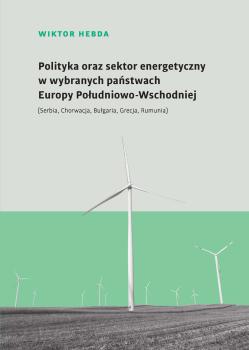Polityka oraz sektor energetyczny w wybranych państwach Europy Południowo-Wschodniej : (Serbia, Chorwacja, Bułgaria, Grecja, Rumunia)
Słowa kluczowe:
energy policy, energy security, energy sector, Serbia, Croatia, Bulgaria, Greece, RomaniaStreszczenie
POLITICS AND ENERGY SECTOR IN THE SELECTED COUNTRIES OF SOUTHEAST EUROPE (SERBIA, CROATIA, BULGARIA, GREECE, ROMANIA)
The research issue of this monograph comprises a comparative analysis of selected (crucial) countries of Southeast Europe in terms of their energy sector and security. The indicated region is specific due to its small area and big political socioeconomic diversity. On the one hand, the region contains countries which have been functioning for decades within the EU (Greece) or are new members of the EU (Croatia, Romania, Bulgaria). On the other hand, in the analysed area there are countries which have formed a strategic alliance with Russia and develop cooperation with China (Serbia). Each of the mentioned countries is marked by the different energy potential (resources) and consequently the different shape of the energy sector. An analysis of the politics and energy sector of the indicated countries allows to understand how their energy security is created and which factors could support its growth or threaten its stability. Although the issue is considered from the perspective of a state, the analysis gives also a possibility to determine current and future roles of the countries from Southeast Europe in assurance of the transregional energy security.
The monograph consists of seven chapters in which issues concerning the energy sector and security of the selected countries from Southeast Europe are discussed. The first chapter deals briefly with theoretical issues which explain the most important concepts used in the work, i.e. energy security, politics and energy strategy. In the next chapter energy projects in the Balkan area, Central Europe and Southeast Europe are presented. The attention has been primarily focused on concepts developing infrastructure of the distribution of strategic raw materials, i.e. natural gas and oil. Five next chapters constitute the analysis of the politics and energy sector in the selected countries of Southeast Europe: Croatia, Serbia, Bulgaria, Greece and Romania. The analysis of five cases has been conducted with the same criteria. The first parameter is an estimation of the resources of the strategic energy raw materials and the potential of renewable energy sources. The next criterion is the analysis of the energy sector of a particular country in the context of production and consumption of electric energy as well as the level of production and import of oil, natural gas and coal. And the third parameter relates to specification of the most important elements of energy strategies of the particular countries and their implementation in realized and planned investments in the filed of energy technology with the special emphasis on concepts developing gas, oil and nuclear sectors, and renewable energy sources.
Rozdziały
-
TABLE OF CONTENTS
-
Wykaz najważniejszych skrótów .......... 9
-
Wstęp .......... 11
-
Rozdział 1. Bezpieczeństwo energetyczne a polityka oraz strategia energetyczna państwa – zarys teoretyczny .......... 17
-
1.1. Bezpieczeństwo energetyczne państwa .......... 17
-
1.2. Polityka oraz strategia energetyczna państwa .......... 24
-
Rozdział 2. Projekty energetyczne na obszarze Bałkanów, Europy Środkowej i Południowo-Wschodniej .......... 33
-
2.1. Najważniejsze projekty energetyczne .......... 33
-
2.2. Projekty energetyczne w Europie Środkowej i Południowo-Wschodniej a bezpieczeństwo energetyczne regionu oraz Europy .......... 47
-
Rozdział 3. Polityka oraz sektor energetyczny Serbii .......... 53
-
3.1. Zasoby surowców energetycznych Serbii .......... 54
-
3.2. Sektor energetyczny Serbii .......... 59
-
3.3. Strategia energetyczna Serbii .......... 64
-
3.4. Wnioski .......... 76
-
Rozdział 4. Polityka oraz sektor energetyczny Chorwacji .......... 77
-
4.1. Zasoby surowców energetycznych Chorwacji .......... 78
-
4.2. Sektor energetyczny Chorwacji .......... 83
-
4.3. Strategia energetyczna Chorwacji .......... 88
-
4.4. Wnioski .......... 96
-
Rozdział 5. Polityka oraz sektor energetyczny Bułgarii .......... 99
-
5.1. Zasoby surowców energetycznych Bułgarii .......... 99
-
5.2. Sektor energetyczny Bułgarii .......... 104
-
5.3. Strategia energetyczna Bułgarii .......... 108
-
5.4. Wnioski .......... 117
-
Rozdział 6. Polityka oraz sektor energetyczny Grecji .......... 119
-
6.1. Zasoby surowców energetycznych Grecji .......... 120
-
6.2. Sektor energetyczny Grecji .......... 123
-
6.3. Strategia energetyczna Grecji .......... 129
-
6.4. Wnioski .......... 142
-
Rozdział 7. Polityka oraz sektor energetyczny Rumunii .......... 145
-
7.1. Zasoby surowców energetycznych Rumunii .......... 146
-
7.2. Sektor energetyczny Rumunii .......... 150
-
7.3. Strategia energetyczna Rumunii .......... 156
-
7.4. Wnioski .......... 167
-
Zakończenie .......... 169
-
Spis rysunków .......... 175
-
Spis tabel .......... 177
-
Bibliografia .......... 179
-
Indeks .......... 199
Downloads
Bibliografia





